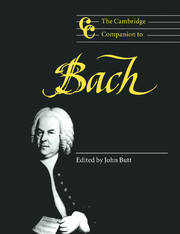Book contents
- Frontmatter
- Introduction
- Part I The historical context: society, beliefs and world-view
- Part II Profiles of the music
- Part III Influence and reception
- 12 Bach as teacher and model
- 13 Changing issues of performance practice
- 14 Bach reception: some concepts and parameters
- 15 Reinterpreting Bach in the nineteenth and twentieth centuries
- Notes
- Select bibliography
- General Index
- Index of works
14 - Bach reception: some concepts and parameters
from Part III - Influence and reception
Published online by Cambridge University Press: 28 September 2011
- Frontmatter
- Introduction
- Part I The historical context: society, beliefs and world-view
- Part II Profiles of the music
- Part III Influence and reception
- 12 Bach as teacher and model
- 13 Changing issues of performance practice
- 14 Bach reception: some concepts and parameters
- 15 Reinterpreting Bach in the nineteenth and twentieth centuries
- Notes
- Select bibliography
- General Index
- Index of works
Summary
Questions – parameters – possible solutions (F. Busoni)
To raise objections about the very topic one has been asked to write about is surely unusual; perhaps it would be better not to address the topic at all. But that would be far too simple a solution. It makes more sense to formulate the discontent, not as a disclaimer soon to be forgotten, but rather as a critical undercurrent that will run throughout both this chapter and the next.
Three fundamental objections can be raised against the assigned topic. First, much of the material is ubiquitous, given that there is hardly a composer of the nineteenth or twentieth century who has not occupied himself with Bach, whether it be by choice or requirement. Perhaps it would therefore be more feasible to investigate those who have given Bach a wide berth. Delimiting the material in this manner would serve as a corrective to the unattainable goal of comprehensively listing and critically interpreting all forms of Bach reception. Secondly, there is the danger of mythologising Bach by producing yet another historiographically out-moded description of great heroes, a monocausal, linear music history delineated by monuments, Bach – Beethoven – Brahms – Schoenberg – Boulez. Thirdly, there is the historical and ontological difference between Bach's horizon of expectation and that of the present day; the ubiquity of Bach's music and the mythologising of Bach today contradict the situation in his own time.
- Type
- Chapter
- Information
- The Cambridge Companion to Bach , pp. 218 - 225Publisher: Cambridge University PressPrint publication year: 1997
- 1
- Cited by



